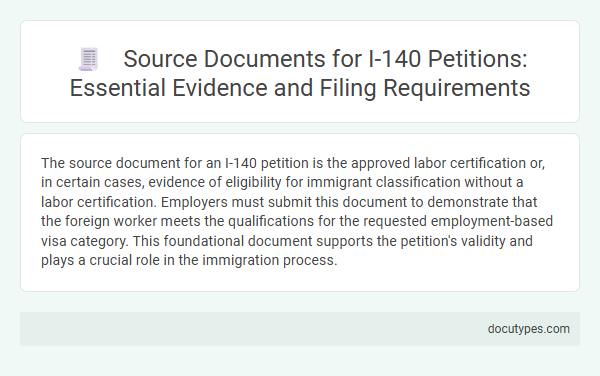The source document for an I-140 petition is the approved labor certification or, in certain cases, evidence of eligibility for immigrant classification without a labor certification. Employers must submit this document to demonstrate that the foreign worker meets the qualifications for the requested employment-based visa category. This foundational document supports the petition's validity and plays a crucial role in the immigration process.
Overview of I-140 Petitions and Their Importance
An I-140 petition is a crucial step in the employment-based immigration process for individuals seeking permanent residency in the United States. This petition serves as a formal request to the U.S. Citizenship and Immigration Services (USCIS) to classify an immigrant worker under a specific employment-based visa category.
The source document for an I-140 petition is typically the employer's petition package, which includes evidence of the job offer and the beneficiary's qualifications. Your petition must demonstrate the legitimacy of the job opportunity and the ability to pay the offered wage to ensure approval.
Key Source Documents Required for I-140 Submission
| Key Source Document | Description |
|---|---|
| Form I-140, Immigrant Petition for Alien Worker | This is the primary petition form filed by an employer on behalf of a foreign worker seeking employment-based permanent residency. |
| Labor Certification (PERM) | Certification from the Department of Labor confirming that there are no qualified U.S. workers available for the position and that employment of the foreign worker will not adversely affect wages and working conditions. |
| Employer's Support Letter | A detailed letter from the employer outlining the job offer, duties, and evidence of the ability to pay the offered wage. |
| Evidence of Worker's Qualifications | Includes educational degrees, professional licenses, and work experience letters related to the offered position. |
| Proof of Employer's Business Existence | Documents such as tax returns, annual reports, or business licenses demonstrating the employer's active and legitimate business operations. |
| Filing Fee | The required USCIS filing fee must accompany your I-140 submission for processing. |
Employer Support Letters: Content and Format Guidelines
The source document for an I-140 petition primarily includes the Employer Support Letter, which verifies the job offer and the beneficiary's qualifications. This letter is a critical piece of evidence submitted to U.S. Citizenship and Immigration Services (USCIS).
Employer Support Letters must clearly outline the job position, duties, and minimum qualifications required. The letter should confirm the employer's intent to hire the beneficiary upon approval of the petition. It must be written on company letterhead, signed by an authorized representative, and include detailed contact information to ensure authenticity and credibility.
Proof of Job Offer: Essential Employment Documentation
The source document for an I-140 petition is the proof of a legitimate job offer from a U.S. employer. Essential employment documentation includes a detailed job offer letter, an approved labor certification (if required), and evidence of the employer's ability to pay the offered wage. Your petition must present these documents clearly to demonstrate the genuine employment opportunity supporting your immigration case.
Evidence of Educational Qualifications and Evaluation
The source document for an I-140 petition primarily includes proof of the beneficiary's educational qualifications. Proper evaluation of foreign degrees is essential to ensure they meet U.S. equivalency standards.
- Educational Credentials - Official diplomas, transcripts, and degree certificates are submitted to verify academic achievements.
- Credential Evaluation Report - A professional evaluation from a recognized agency translates foreign educational qualifications into U.S. equivalents.
- Relevance to Petition - The educational evidence must directly support the job requirements specified in the I-140 petition.
Work Experience Letters: Standards and Requirements
The source document for an I-140 petition includes work experience letters that demonstrate your qualifications and professional history. These letters must be on official company letterhead and contain detailed job descriptions, dates of employment, and the employer's contact information.
Work experience letters should clearly state your role, responsibilities, and skills relevant to the petition category. Accurate and verifiable information in these letters strengthens the credibility of your I-140 petition and supports your eligibility.
Financial Ability of U.S. Employer: Acceptable Proof
The source document for an I-140 petition primarily includes evidence demonstrating the financial ability of the U.S. employer to pay the offered wage. Acceptable proof consists of annual reports, federal tax returns, or audited financial statements showcasing consistent revenue and net income. You must provide these documents to ensure the petition reflects the employer's capability to fulfill financial obligations.
Professional Licenses and Certifications for I-140
What is the source document for an I-140 petition regarding professional licenses and certifications? The source document for an I-140 petition includes valid professional licenses and certifications that demonstrate your qualifications for the offered position. These credentials serve as official proof of your expertise and are essential for establishing your eligibility under specific employment-based immigration categories.
Translation and Authentication of Foreign Documents
The source document for an I-140 petition is the original evidence that supports the immigrant petition, including foreign educational and professional credentials. Proper translation and authentication of these foreign documents are crucial for USCIS to accept and verify the petition.
- Certified Translation - All foreign documents must be translated into English by a certified translator or translation company to ensure accuracy.
- Authentication Requirement - Foreign documents often require authentication through an apostille or consular legalization to confirm their legitimacy.
- Submission Guidelines - Translated and authenticated documents must be submitted with the I-140 petition to avoid delays or denials in the immigration process.
What Is the Source Document for an I-140 Petition? Infographic

